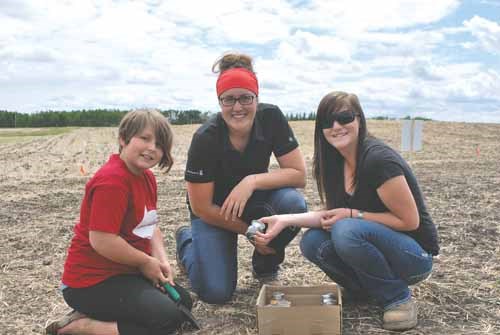Young students from Yorkton were involved last week in a 'Pizza Farm' initiative designed to help them better understand framing and where their food comes from.
"Naomi (Paley), and I decided to set up a pizza farm," said Rachel Kraynick, Regional Farm Business Management Specialist with the Saskatchewan Ministry of Agriculture in Yorkton.
Kraynick said with the idea established "we partnered with several industry groups."
At the forefront of partnerships was one which brought Agriculture in the Classroom on board. The group "develops curriculum on agriculture for school age kids," said Kraynick. The pizza farm being a hands-on opportunity to teach students made being involved together natural.
The local project targeted Grade 3 and 4 students because they already have curriculum based on soils and plants. Sixty students from Dr. Brass and St. Paul's Schools took part.
"We were approached," said Dr. Brass teacher Megan Reminek, who added it fit well with her class as she has a "garden in my classroom," something made possible through the "Little Green Thumb Program out of Saskatoon." The program provides the soil and seed for the classroom garden, and the Pizza Farm really built upon what students were doing in class.
The potash producer Agrium became involved. The company sponsors what is essentially an interpretive centre contained in a semi trailer, said Paley, Regional Livestock Specialist with the Saskatchewan Ministry of Agriculture in Yorkton. The displays included teaching about soils, water, and how plants grow.
"It shows what nutrients plants need to grow," said Paley.
James Richardson International provided the land for the pizza farm, a piece of land laid out in a circular pattern with 10 slices, each growing something farmers produce, said Kraynick.
"They're ingredients used in making a pizza," she said.
Paley added they chose the idea of a pizza because it was something young students could more easily relate too.
The 'slices' included four pieces which were planted to show the importance of technology to production.
Wheat and canola were seeded with modern equipment, inoculants and fertilizer, and next to each a slice was simply planted by broadcasting seeds by hand, explained Paley.
"It's part of agriculture awareness," she said, noting there are concerns about the use of herbicides, chemicals and fertilizers. She said the side-by-side slices will show how such things improve crop health and production.
"Without them (fertilizers and chemicals) we wouldn't be able to feed the world," she added.
Paley said there were also efforts to show agricultural producers are environmentally aware. With that in mind Ducks Unlimited and the Assiniboine Watershed Authority both took part to explain that they work with farmers, but also care about "protecting water and the environment."
Other 'slices' included garlic, with the local Garlic Garden on hand to help educate students, and to give them a taste of fresh garlic.
Onions were planted in a sixth slice, basil and oregano in the seventh and tomatoes and peppers in the eighth.
The last two slices were reserved as pasture for a dairy cow, producer of milk for cheese, and hogs, as the source of ham and bacon. Paley said both will be on hand in the fall when students return to see the results of the growing season.
Lorraine Huang, also a teacher at Dr. Brass School said the Pizza Farm Program exceeded her expectations.
"It was far more than we expected," she said. "It was so well-organized."
Huang said the basic premise for the farm was a great one to get students interested.
"They had kids engaged even before we started with (the idea) of pizza," she said.
Reminek agreed that targeting Grades 3 and 4 and using pizza as the connection to farming was a great idea.
"They were engaged and active all day," she said.
Huang said the chance to actually get out in a field and get working in the dirt was something unique for most of the students.
"For a lot of our students it was their first time out at a farm," she said. "The hands-on was awesome for our kids."
Reminek agreed few students have direct contact with farms, estimating 90 per cent of their students had not previously been on a farm.
As a result of the experience Reminek said the experience was the "best field trip ever," for her students.
Asked if all students should experience the pizza farm Huang was quick to reply saying "it would be an absolute dream for them to do that."
Over the summer the 'slices' will be weeded and watered through yet another partnership, this one with the province's Justice Department. Residents at Whitespruce who have a community service element to their sentence will do the work, explained Kraynick.




